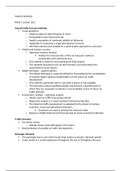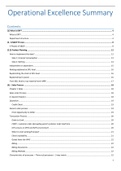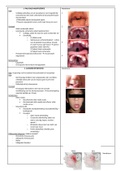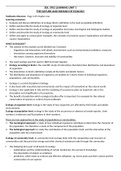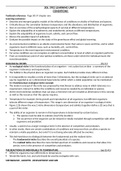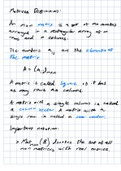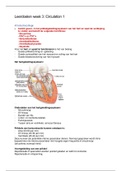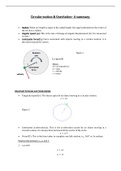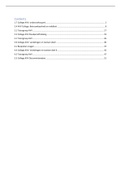Capacity planning
Week 1 Lecture 1&2:
Annual traffic forecast methods:
Trend projection
o Historical data for determination of trend
o Extrapolation from historical trend
o Implicit assumption of continued stability of influences
o Applicable for preparing a single development scenario
o Not time intensive and suitable for a quick & dirty approach to a forecast
Market and industry surveys
o High level research method
Analyze the characteristics of the air transport market in
combination with catchment area
o This method is useful for forecasting green field airports
o The obtained outcomes must, by the forecaster, be transformed into
quantitative forecast figures
Delphi technique – experts opinion
o The Delphi technique is a special method for forecasting by the consolidation
of aviation expert opinions (stakeholders) on the future air traffic
development
o This method is generally used in case data is sparse or not available
o The forecaster selects (qualified) people and presents a questionnaire in
which they are requested to indicate a most probable course of future air
traffic demand
Econometric method – regression analysis
o Mostly used air traffic forecasting method
o Regression analysis is a casual method of demand projection
o The historical traffic development is explained by the impact of various
economic, social and operational indicators
Outcomes are used to develop the forecast model
o Requires reliable historical and forecast data of (socio-economic) indicators
Traffic forecasts:
Are always wrong
o Nobody knows what will happen in the future
Representation of possible air traffic developments
Passenger demand:
The passenger type is one of the factors that makes an airports’ demand specific
It also results in a certain peakyness throughout the day or throughout the year
,Passenger volume distribution:
.
How is forecasting related to catchment area:
Connections determine options
Airline determine connections
People determine need for demand
Airports facilitates airlines
Catchment area:
Is not constant
o The content changes
Business environment
Population composition
Migrant patterns:
The bilateral flows between 196 countries are estimated from sequential stock
tables that are comparable across. Countries and capture the number of people who
changed their country of residence between mid 2005 and mid 2010
The circular plot shows the estimates of directional flows between the 50 countries
that send and/or receive at least 0,5% of the world’s migrants in 2005-10
Airport data:
Catchment area differs by geographical geometry and position of country
Data can be found at CAPA
Preparing to forecast:
Know what is happening in your country
Know what type of airport and catchment area you have
Understand the dynamics people moving around
, Capacity steps:
Potential traffic
Assess capacities
Determine required capacities
Traffic throughput
Week 1 Lecture 1&2:
Annual traffic forecast methods:
Trend projection
o Historical data for determination of trend
o Extrapolation from historical trend
o Implicit assumption of continued stability of influences
o Applicable for preparing a single development scenario
o Not time intensive and suitable for a quick & dirty approach to a forecast
Market and industry surveys
o High level research method
Analyze the characteristics of the air transport market in
combination with catchment area
o This method is useful for forecasting green field airports
o The obtained outcomes must, by the forecaster, be transformed into
quantitative forecast figures
Delphi technique – experts opinion
o The Delphi technique is a special method for forecasting by the consolidation
of aviation expert opinions (stakeholders) on the future air traffic
development
o This method is generally used in case data is sparse or not available
o The forecaster selects (qualified) people and presents a questionnaire in
which they are requested to indicate a most probable course of future air
traffic demand
Econometric method – regression analysis
o Mostly used air traffic forecasting method
o Regression analysis is a casual method of demand projection
o The historical traffic development is explained by the impact of various
economic, social and operational indicators
Outcomes are used to develop the forecast model
o Requires reliable historical and forecast data of (socio-economic) indicators
Traffic forecasts:
Are always wrong
o Nobody knows what will happen in the future
Representation of possible air traffic developments
Passenger demand:
The passenger type is one of the factors that makes an airports’ demand specific
It also results in a certain peakyness throughout the day or throughout the year
,Passenger volume distribution:
.
How is forecasting related to catchment area:
Connections determine options
Airline determine connections
People determine need for demand
Airports facilitates airlines
Catchment area:
Is not constant
o The content changes
Business environment
Population composition
Migrant patterns:
The bilateral flows between 196 countries are estimated from sequential stock
tables that are comparable across. Countries and capture the number of people who
changed their country of residence between mid 2005 and mid 2010
The circular plot shows the estimates of directional flows between the 50 countries
that send and/or receive at least 0,5% of the world’s migrants in 2005-10
Airport data:
Catchment area differs by geographical geometry and position of country
Data can be found at CAPA
Preparing to forecast:
Know what is happening in your country
Know what type of airport and catchment area you have
Understand the dynamics people moving around
, Capacity steps:
Potential traffic
Assess capacities
Determine required capacities
Traffic throughput

